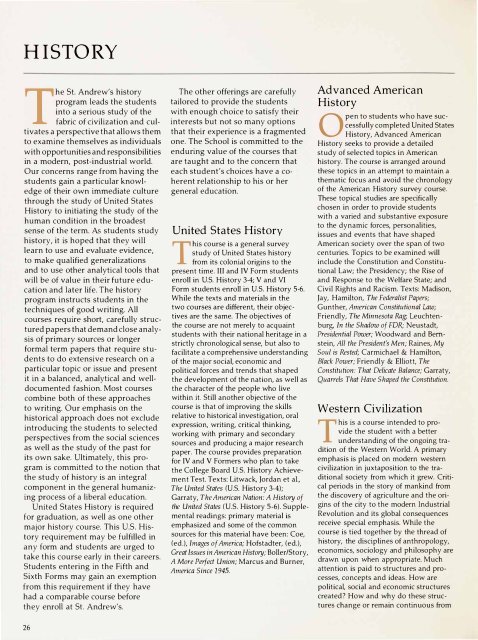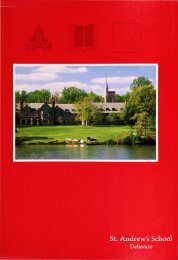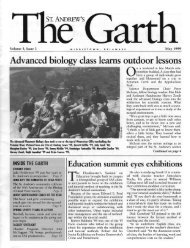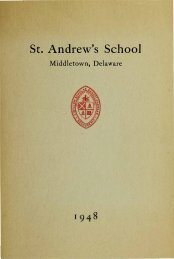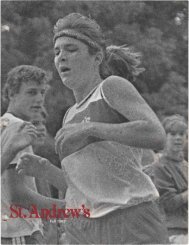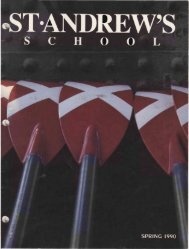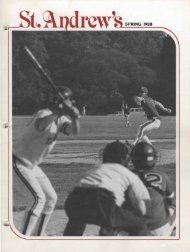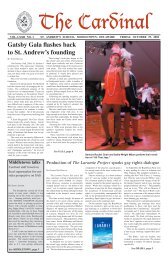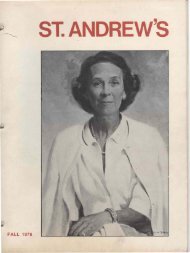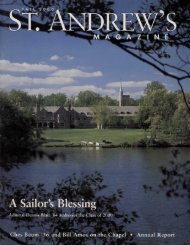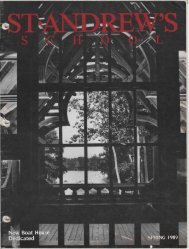Untitled - Saint Andrew's School Archive - St. Andrew's School
Untitled - Saint Andrew's School Archive - St. Andrew's School
Untitled - Saint Andrew's School Archive - St. Andrew's School
Create successful ePaper yourself
Turn your PDF publications into a flip-book with our unique Google optimized e-Paper software.
HISTORY<br />
The <strong>St</strong>. <strong>Andrew's</strong> history<br />
program leads the students<br />
into a serious study of the<br />
fabric of civilization and cultivates<br />
a perspective that allows them<br />
to examine themselves as individuals<br />
with opportunities and responsibilities<br />
in a modern, post-industrial world.<br />
Our concerns range from having the<br />
students gain a particular knowledge<br />
of their own immediate culture<br />
through the study of United <strong>St</strong>ates<br />
History to initiating the study of the<br />
human condition in the broadest<br />
sense of the term. As students study<br />
history, it is hoped that they will<br />
learn to use and evaluate evidence,<br />
to make qualified generalizations<br />
and to use other analytical tools that<br />
will be of value in their future education<br />
and later life. The history<br />
program instructs students in the<br />
techniques of good writing. All<br />
courses require short, carefully structured<br />
papers that demand close analysis<br />
of primary sources or longer<br />
formal term papers that require students<br />
to do extensive research on a<br />
particular topic or issue and present<br />
it in a balanced, analytical and welldocumented<br />
fashion. Most courses<br />
combine both of these approaches<br />
to writing. Our emphasis on the<br />
historical approach does not exclude<br />
introducing the students to selected<br />
perspectives from the social sciences<br />
as well as the study of the past for<br />
its own sake. Ultimately, this program<br />
is committed to the notion that<br />
the study of history is an integral<br />
component in the general humanizing<br />
process of a liberal education.<br />
United <strong>St</strong>ates History is required<br />
for graduation, as well as one other<br />
major history course. This U.S. History<br />
requirement may be fulfilled in<br />
any form and students are urged to<br />
take this course early in their careers.<br />
<strong>St</strong>udents entering in the Fifth and<br />
Sixth Forms may gain an exemption<br />
from this requirement if they have<br />
had a comparable course before<br />
they enroll at <strong>St</strong>. <strong>Andrew's</strong>.<br />
The other offerings are carefully<br />
tailored to provide the students<br />
with enough choice to satisfy their<br />
interests but not so many options<br />
that their experience is a fragmented<br />
one. The <strong>School</strong> is committed to the<br />
enduring value of the courses that<br />
are taught and to the concern that<br />
each student's choices have a coherent<br />
relationship to his or her<br />
general education.<br />
United <strong>St</strong>ates History<br />
This course is a general survey<br />
study of United <strong>St</strong>ates history<br />
from its colonial origins to the<br />
present time. III and IV Form students<br />
enroll in U.S. History 3-4; V and VI<br />
Form students enroll in U.S. History 5-6.<br />
While the texts and materials in the<br />
two courses are different, their objectives<br />
are the same. The objectives of<br />
the course are not merely to acquaint<br />
students with their national heritage in a<br />
strictly chronological sense, but also to<br />
facilitate a comprehensive understanding<br />
of the major social, economic and<br />
political forces and trends that shaped<br />
the development of the nation, as well as<br />
the character of the people who live<br />
within it. <strong>St</strong>ill another objective of the<br />
course is that of improving the skills<br />
relative to historical investigation, oral<br />
expression, writing, critical thinking,<br />
working with primary and secondary<br />
sources and producing a major research<br />
paper. The course provides preparation<br />
for IV and V Formers who plan to take<br />
the College Board U.S. History Achievement<br />
Test. Texts: Litwack, Jordan et al.,<br />
The United <strong>St</strong>ates (U.S. History 3-4);<br />
Garraty, The American Nation: A History of<br />
the United <strong>St</strong>ates (U.S. History 5-6). Supplemental<br />
readings: primary material is<br />
emphasized and some of the common<br />
sources for this material have been: Coe,<br />
(ed.), Images of America; Hofstadter, (ed.),<br />
Great Issues in American History; Boller/<strong>St</strong>ory,<br />
A More Perfect Union; Marcus and Burner,<br />
America Since 1945.<br />
Advanced American<br />
History<br />
0 pen to students who have successfully<br />
completed United <strong>St</strong>ates<br />
History, Advanced American<br />
History seeks to provide a detailed<br />
study of selected topics in American<br />
history. The course is arranged around<br />
these topics in an attempt to maintain a<br />
thematic focus and avoid the chronology<br />
of the American History survey course.<br />
These topical studies are specifically<br />
chosen in order to provide students<br />
with a varied and substantive exposure<br />
to the dynamic forces, personalities,<br />
issues and events that have shaped<br />
American society over the span of two<br />
centuries. Topics to be examined will<br />
include the Constitution and Constitutional<br />
Law; the Presidency; the Rise of<br />
and Response to the Welfare <strong>St</strong>ate; and<br />
Civil Rights and Racism. Texts: Madison,<br />
Jay, Hamilton, The Federalist Papers;<br />
Gunther, American Constitutional Law;<br />
Friendly, The Minnesota Rag; Leuchtenburg,<br />
In the Shadow of FOR; Neustadt,<br />
Presidential Power; Woodward and Bernstein,<br />
All the President's Men; Raines, My<br />
Soul is Rested; Carmichael & Hamilton,<br />
Black Power; Friendly & Elliott, The<br />
Constitution: That Delicate Balance; Garraty,<br />
Quarrels That Have Shaped the Constitution.<br />
Western Civilization<br />
This is a course intended to provide<br />
the student with a better<br />
understanding of the ongoing tradition<br />
of the Western World. A primary<br />
emphasis is placed on modern western<br />
civilization in juxtaposition to the traditional<br />
society from which it grew. Critical<br />
periods in the story of mankind from<br />
the discovery of agriculture and the origins<br />
of the city to the modern Industrial<br />
Revolution and its global consequences<br />
receive special emphasis. While the<br />
course is tied together by the thread of<br />
history, the disciplines of anthropology,<br />
economics, sociology and philosophy are<br />
drawn upon when appropriate. Much<br />
attention is paid to structures and processes,<br />
concepts and ideas. How are<br />
political, social and economic structures<br />
created? How and why do these structures<br />
change or remain continuous from<br />
26


